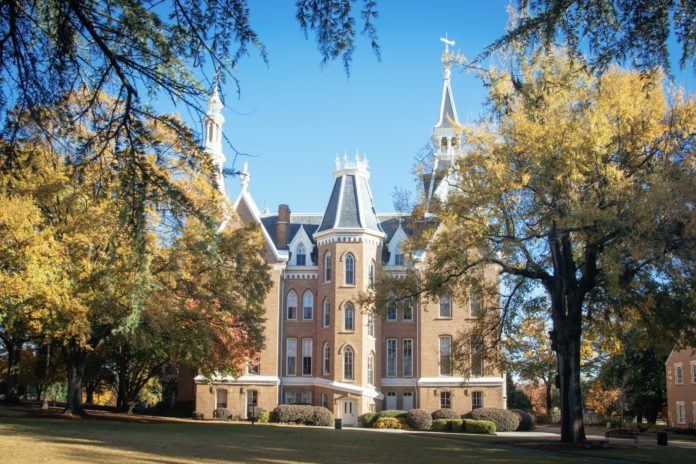WARNER ROBINS – Mercer University and Robins Air Force Base paid tribute Thursday evening to a partnership agreement – a pact formed 20 years ago that sparked a school of engineering on the Macon campus, an engineering research center in Warner Robins and plugged a number of engineering vacancies at the huge military installation.
The reception at the Museum of Aviation recognized the vision of university and base leaders in 1983 and honored engineering graduates who have chosen to remain in the Middle Georgia area.
Retired Air Force Maj. Gen. Cornelius Nugteren and Dr. Kirby Godsey, Mercer University’s president, were key players in a move that has produced more than 1,000 engineering graduates since the school was established in 1985 and spawned the Mercer Engineering Research Center in 1987.
“Gen. Nugteren came to me in 1983,” said Godsey, “and it became clear that the economic development of the region and the infrastructure of the base very much needed an engineering program.”
Nugteren, Warner Robins Air Logistics Center commander at the time, was faced with growing engineering vacancies and few options for filling them. He praised Godsey’s courage in getting the ball rolling.
“(Godsey) said if you want an engineering school, Mercer will give you one. And that’s where it all started,” Nugteren said.
Despite the potential for strong opposition, Godsey believed the needs justified the risks.
“One of Mercer’s strengths has been our connection with the community. That’s been one of our defining touchstones,” he said. “The engineering school is just one more example.”
He added, “We now have a waiting list of students wanting to get in, and the school is broadly recognized. It has made a very positive and important impact on the university and enabled us to make a greater difference in the region.”
Nugteren says the impact at Robins has been profound.
“Our technical growth would not have happened without the engineering school,” he said. “We’ve filled a lot of our engineering vacancies. We have more people with master’s degrees and we’ve been able to get new, young blood into a number of base agencies.”
Maj. Gen. Donald Wetekam, the current Warner Robins ALC commander, says Mercer’s contributions continue.
“The Air Force and Robins have felt the pinch of finding and hiring young, quality engineers to step in beside our experts,” he said. “Mercer has played a critical role in that endeavor, providing more graduates to Robins than any other university in 2002.”
Dave Barwick, who heads Mercer’s research center in Warner Robins, says his organization gives Mercer students, graduates and faculty a local opportunity to practice the engineering craft.
“And at the same time, we’ve become a very important partner with the base,” he said. Since 1987, the center has received $150 million in contract research work, with the largest portion coming from Robins.
With the pending 2005 round of base closure decisions likely to focus on community partnerships, the Robins-Mercer relationship is important.
“It should be a very positive aspect in the BRAC conversations,” said Godsey. BRAC, or base realignment and closure, is a federal process for selecting bases for closure or for changes in workload.
Nugteren, who now is a senior adviser at the research center, said having an engineering school and a research center just outside the base gate is a big plus on the BRAC scorecard.
“I don’t think any other logistics center can say that,” he said.
Barwick said the partnership is growing and will be looked at very favorably by the BRAC commission. “There’s an academic environment at Mercer and a military environment down here,” he said. “We have one foot firmly planted in both and that puts us in position to encourage stronger and stronger relationships. We do that continually.”
To contact Gene Rector, call 923-3109, extension 239, or e-mail grector@macontel.com.








